| All Artists: Henry Brant, Robert Aitken, Werner Herbers, Arioso Wind Quintet, Netherlands Wind Ensemble, New Performance Group, Telluride Glacial Spatial Ensemble, Gerrit Hommerson, Reinbert de Leeuw, Yvar Mikhashoff, Barbara Hannigan, Frank Baer, Baerbel Hacke, John Fago, Kathy Wilkowski, Lauren Pratt, Pamela Zoline Title: The Henry Brant Collection, Vol. 8 Members Wishing: 0 Total Copies: 0 Label: Innova Records Original Release Date: 1/1/2008 Re-Release Date: 2/26/2008 Genres: Pop, Classical Styles: Vocal Pop, Chamber Music, Forms & Genres, Concertos, Historical Periods, Modern, 20th, & 21st Century, Symphonies Number of Discs: 1 SwapaCD Credits: 1 UPC: 726708641528 |
Search - Henry Brant, Robert Aitken, Werner Herbers :: The Henry Brant Collection, Vol. 8
 | Henry Brant, Robert Aitken, Werner Herbers The Henry Brant Collection, Vol. 8 Genres: Pop, Classical
|
Larger Image |
CD Details |
CD ReviewsMore Brant - outlandish, provocative, and very funny Discophage | France | 03/30/2008 (4 out of 5 stars) "Unlike the other instalments in this Henry Brant series from Innova, this disc doesn't feature one or a small number of substantial pieces, but collates 9 shorter ones. They may not be essential and not all are interesting, especially, in my opinion, those like the 2-Piano Toccata and the Jazz Clarinet Concerto, where I find that Brant doesn't rise above his basic material and just writes plain ragtime or background music for big-band jazz - nothing like Stravinsky's appropriation of Jazz in the Ebony Concerto. Not surprisingly maybe, they are among the early pieces on this collection (1940 and 1946). The disc also showcases three 1984 reworkings of more early pieces, "Whoopee in D" (1938), "Music for a Five and Dime Store" (1932), "Double-Crank Hand Organ Music" (1933).
But the best ones display again the composer at his most outlandishly provocative, free - and funny. Much of it sounds like zany circus music or music for the vaudeville - Brant's preference for the piercing sonorities of the woodwind ensemble works to that effect, as well as his glee at using a high-pitched coloratura soprano (called "sopranino") voice sounding like a recording played at twice the speed, as in "Inside Track" - actually a spatial Piano Concerto in which only the soloist, a percussionist and the principal conductor are on stage, with a string septet on one side of the hall and a woodwind quartet on another one, while the back of the hall is occupied by a "small street band" including the sopranino. The Concerto alternates between the comical vaudeville music, and a busy piano part, sometimes dreamy, mostly violently pounding, with disjointed rhythms reminiscent of Nancarrow's Studies for Player Piano. It would certainly be easy not to take this composition very seriously, but I find it to be one of the most original Piano Concertos written in the 20th Century - or any century for that matter. "Double-Crank Hand Organ Music" seeks to reproduce with two pianos and a percussion ensemble the sounds of the broken-down and out-of-tune hand organs which were common in the streets of New York before mayor La Guardia banned them in 1940. It sounds like a hilarious breed of Ives, Antheil and Nancarrow. "Music for a Five and Dime Store" is written for piano, violin and... kitchen hardware, and sets out to recapture the sound of the bangy pianos that were often found in such chain stores in the 1920s and early `30s with a real pianist playing on request any sheet music sold at the counter. "Revenge before breakfast" (title unexplained) is scored for three duos (woodwinds, percussion, strings) spatially separated in the concert venue, with interludes played by an accordion sounding like the chorales of the missionaries from the salvation army (integral with mock weeps at the end). The music is fascinatingly enigmatic, often consisting of whiffs of sounds, passages of percussion clangs, high-pitched string wails or bird cries, soft-sounding melodies from the woodwinds. But after a while it does seem to wander around with no clear structure or direction. "Dialog in the Jungle" (1964) is another spatial work for solo voice, five woodwinds and five brass, after a hilarious poem by Brant's wife, Patricia Gorman Brant ("The tiger growled: You shall not ride upon my back,/ And I agreed/ but somehow found myself astride./ I think that hungry tiger lied"). The non-sensical humor of Walton's Parade can come to mind, but this is more disjointed and rambunctious. Frank Baker, the reciter, does a great job at it. "Altitude 8750" is, if I understand the liner notes, a collective improvisation on musical materials provided by Brant. Besides a vocal ensemble of 10 singers, there are 16 performers - actually 16 composers, gathered for the "Composer to Composer" 1990 summer conference in Telluride, Colorado, a mountain ski resort culminating at 8750 feet - hence the title. Among them Pauline Oliveiros (accordion), Gloria Cheng (pianoà), Larry Polansky (mandolin), Charles Amirkhanian (glockenspiel), James Tenney (xylophone). In customary Brant fashion the text is very factual and down to earth, describing the effects of altitude on the blood processes, and giving advice to offset them ("Go easy on caffeine! Alcohol in moderation! Eat lightly! No heavy exercice!"). The music sounds like experiment in sound, sometimes like modern free-Jazz, it is often fascinating, and always pretty wild. Sonics are good, except in the Jazz Clarinet Concerto, which was taped in 1984 but apparently preserved only on cassette, making it sound like a transfer of a recording from the fifties, and in "Dialog in the Jungle", recorded in 1964 at the Premiere, and here sounding like the soundtrack from an old TV show - not entirely inappropriate. The liner notes are more informative than usually in this series. The interpretations seem authoritative. Ultimately this is not the best and most significant introduction to the music of Brant (other instalments in this series serve that purpose better), but it is a nice addition to the series. " |

 Track Listings (11) - Disc #1
Track Listings (11) - Disc #1